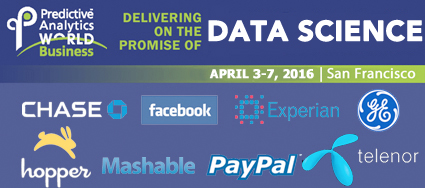Most of us probably remember when a certain big box retailer, thanks to sophisticated data collection and analytics, beat a father to the discovery of his teen daughter’s pregnancy… And those of us who do are likely still cringing. But when it comes to the evolution of healthcare as we know it, Big Data isn’t all that bad. In fact, Big Data has unbridled potential to transform the healthcare industry in ways that promise more proactive, more informed and more efficient care. Here’s how.

USE CODE PATIMES16 for 15% off Predictive Analytics World Conference pass.
With Big Data Comes Intelligence and Innovation.
The HITECH Act spurred widespread adoption of electronic health records (EHR) and as a result we’re seeing a rush of data-centric technologies that integrate with and elaborate on the wealth of collective health information that is now at our fingertips. Electronic triggers derived from algorithms are being used to flag EHRs for everything from hypertension to certain types of cancers for earlier diagnosis and treatment. Infection-control software can identify hospital-derived infections by analyzing records and lab results for faster intervention and better prevention of infections that occur after treatment or surgery. 3D human anatomy models based on imaging data are revolutionizing the way health professionals understand and address the impact of certain health conditions on organs and systems by depicting symptoms on a molecular level. Eventually, this technology could be personalized to offer a comprehensive, virtual representation of an individual’s health. What’s more, providers are tapping into clinical and triage statistics to better manage their resources and reduce costs related to staffing, transfers and empty beds.
Big Data and Patient Engagement go Hand-in-Hand.
Big Data is getting ‘smarter’ every day. Beyond wrist bands and shoe inserts, consumers can (and do) select from an ever-growing list of high-tech gear designed to track and collect heart rates, sleep habits, steps, moves, miles and more. But as the healthcare industry looks to shift patients’ thinking toward proactive awareness and management of health, providers must first seek to understand their behaviors and sentiments by finding ways to take the broader view. This is where Big Data comes in.
While our smart watches monitor our every movement and restless twitch each night, they also capture vital information that, when coupled with other trackable data, can be used to identify potential lurking health risks – for example, frequent insomnia and a consistently elevated heart rate could signal risk for heart disease. Big Data is the key to unlocking individuals’ engagement and accountability in their own health, and that of their family members, which, in turn, can reduce the frequency of ER visits and hospital readmissions.
Big Data is Driving Enhanced Security Measures.
Health-related data is coveted among hackers who recognize the personal information contained in medical records and systems can be even more lucrative than data held by retailers and banks. In fact, a recent study finds that the healthcare industry is 200 percent more likely to fall victim to data theft than other market sectors.
This excerpt is from healthcareitnews. To view the whole article click here.
By: Karin Ratchinsky, Director of Healthcare Strategy, Level 3 Communications.
Originally published at www.healthcareitnews.com